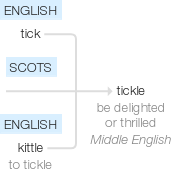Tickle
Middle English (in the sense ‘be delighted or thrilled’): perhaps a frequentative of tick1, or an alteration of Scots and dialect kittle ‘to tickle’ (compare with kittle1).
wiktionary
From Middle English tiklen, tikelen, of uncertain origin. Perhaps from a frequentative form of Middle English tikken(“to touch lightly”), thus equivalent to tick + -le; or perhaps related to Old English tinclian(“to tickle”). Compare North Frisian tigele(“to tickle”) (Hallig dialect), and tiikle(“to tickle”) (Amrum dialect), German dialectal zicklen(“to excite; stir up”). Alternatively, compare Middle English kitlelen("to tickle"; see kittle), of which tickle might ultimately be a metathetic alteration.
etymonline
tickle (v.)
c. 1300 (implied in tickling) "to touch lightly so as to cause a peculiar and uneasy or thrilling sensation in the nerves," of uncertain origin, possibly a frequentative form of tick (v.) in its older sense of "to touch." Some suggest a metathesis of Middle English kittle, which is from a shared Germanic word for "to tickle," but tickle is attested earlier. The Old English form was tinclian.
Meaning "to excite agreeably" (late 14c.) is a translation of Latin titillare. Meaning "to poke or touch so as to excite laughter" is from early 15c.; figurative sense of "to excite, amuse" is attested from 1680s. The noun is recorded from 1801. To tickle (one's) fancy is from 1640s. Related: Tickler.
